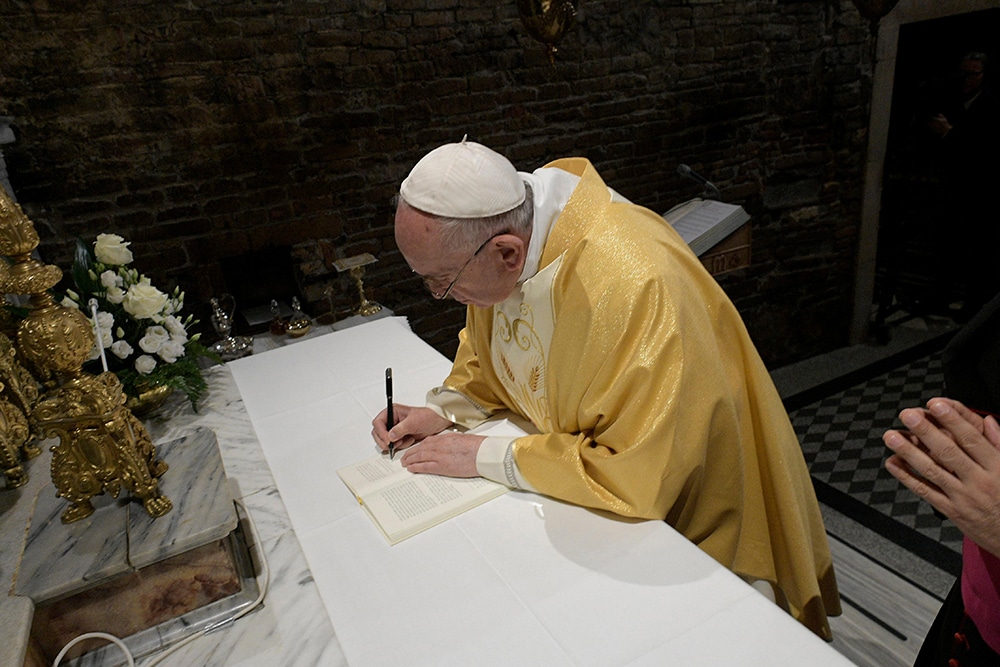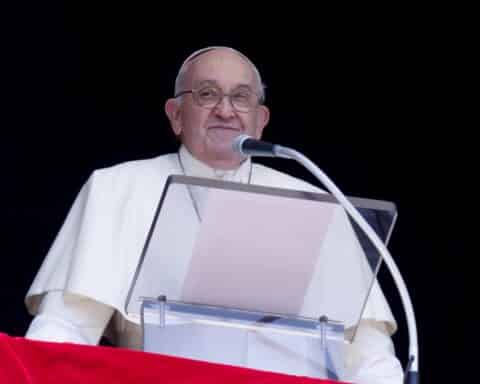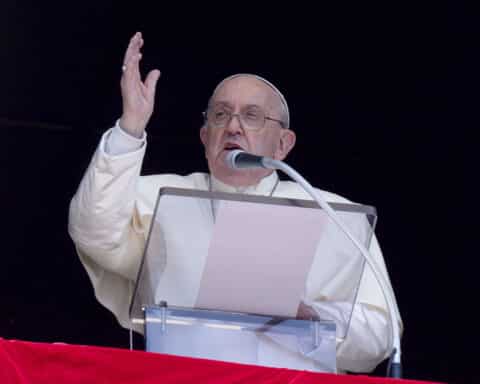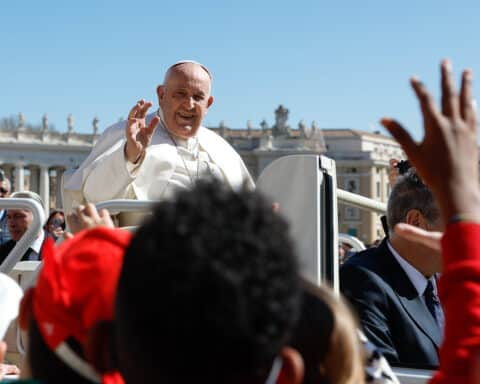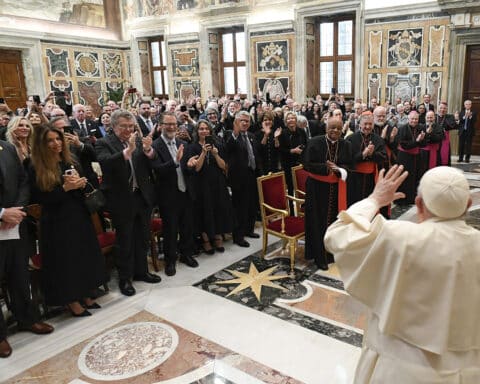More than a few times throughout his six-year pontificate, Pope Francis has related how important he believes dialogue between youths and their elders to be, and in particular how essential it is for young people to be open to listening to and learning from the elderly. In tone and approach, Christus Vivit (“Christ is Alive”) — the post-synodal apostolic exhortation published April 2 in response to last fall’s Ordinary Synod on Young People, the Faith, and Vocational Discernment — feels like the pope is responding to his own recommendation. The 182-page document reads like a compilation of sage advice from a loving grandfather who is sharing his wisdom with the youth, and he writes with great affection for young people.
Addressed “to young people and to the entire people of God,” Christus Vivit is broken into nine chapters: young people in Scripture, Jesus as a youth, the experiences of young people, a great message for young people, the paths for youth, the roots of young people, youth ministry, vocation and discernment. As is to be expected, Pope Francis quotes heavily from the final document of the synod (abbreviated in the footnotes as “FD”) but also from saints, previous popes — including St. Paul VI, St. John Paul II, and Pope Benedict XVI — the documents of the Second Vatican Council, and also from his own addresses and documents. There also is input from the document that resulted from the pre-synodal meeting in March 2018 with young people.
Here are four key takeaways from Christus Vivit.
Young people are rich in role models.
Be it within Scripture or through the examples of the saints, young people have no shortage of those to whom they can look for guidance. “A wise young person is open to the future, yet still capable of learning something from the experience of others,” Pope Francis writes. First and foremost among the examples is the young Jesus himself.
“Jesus does not teach you, young people, from afar or from without, but from within your very youth, a youth he shares with you. It is very important for you to contemplate the young Jesus as presented in the Gospels, for he was truly one of you, and shares many of the features of your young hearts” (No. 31). And Jesus’ mother, Mary, “is the supreme model for a youthful Church that seeks to follow Christ with enthusiasm and docility. … With open heart and soul, she replied, ‘Behold, I am the handmaid of the Lord’ (Lk 1:38)” (No. 43).
Pope Francis also highlights several young saints, including St. Sebastian, St. Francis of Assisi, St. Joan of Arc, St. Kateri Tekakwitha, St. Thérèse of Lisieux, Blessed Pier Giorgio Frassati and others.
Pope Francis reminds the young people that while these are models of holiness, each young person is different and called to his or her own path to holiness.
The challenges facing the youth are real. But they find their antidote in three great truths.
Pope Francis also outlines the many challenges that are facing young people today around the world, including “violence in countless different forms,” ideological colonization, and the desires, hurts and longings prevalent in today’s world. In particular, he highlights the dangers of the “digital environment,” migration and abuse, including clergy sexual abuse.
“Thank God, those who committed these horrible crimes are not the majority of priests, who carry out their ministry with fidelity and generosity,” the pope writes. “I ask young people to let themselves be inspired by this vast majority.” And he added some encouragement: “Ask for the help of the Holy Spirit and confidently aim for the great goal of holiness” (No. 107), adding: “If you are young in years, but feel weak, weary or disillusioned, ask Jesus to renew you. With him, hope never fails” (No. 109).
At the same time, Pope Francis highlights “three great truths that all of us need constantly to keep hearing”: that God loves you; that Christ sacrificed himself to save mankind; and that, echoing the title of the exhortation, “Christ is alive!” He continues: “Because he lives, there can be no doubt that goodness will have the upper hand in your life and that all our struggles will prove worthwhile. If this is the case, we can stop complaining and look to the future, for with him this is always possible” (No. 127).
The key to making the years of youth count is friendship with the Lord.
Pope Francis reminds the youth that they won’t know the “deepest and fullest” meaning of their early years “unless you encounter each day your best friend, the friend who is Jesus” (No. 150).
“With the same love that Christ pours out on us, we can love him in turn and share his love with others, in the hope that they too will take their place in the community of friendship he established,” he writes. “… Friendship with Jesus cannot be broken. He never leaves us, even though at times it appears that he keeps silent” (Nos. 153-154).
To begin and maintain this friendship, Pope Francis encourages regular prayer, which he calls “both a challenge and an adventure.”
“Gradually Jesus makes us appreciate his grandeur and draw nearer to him,” he writes. “Prayer enables us to share with him every aspect of our lives and to rest confidently in his embrace. At the same time, it gives us a share in his own life and love” (No. 155).
He also encourages young people to mature in holiness and to move forward as courageous missionaries. “You have to discover who you are and develop your own way of being holy, whatever others may say or think,” he writes. “Becoming a saint means becoming more fully yourself, becoming what the Lord wished to dream and create, and not a photocopy” (No. 162).
He continued: “He invites us to be fearless missionaries wherever we are and in whatever company we find ourselves: in our neighborhoods, in school or sports or social life, in volunteer service or in the workplace. Wherever we are, we always have an opportunity to share the joy of the Gospel” (No. 177).
Discerning one’s vocation is how young people can respond to the plan the Lord has for them.
Pope Francis saves his final advice for the subjects of vocation and discernment. Vocation, he writes to the young people, “is a path guiding your many efforts and actions towards service to others.” It is “a recognition of why I was made, why I am here on earth, and what the Lord’s plan is for my life” (No. 256). To respond, we must find “our true selves in the light of God and (let) our lives flourish and bear fruit” (No. 257).
In addition to the priesthood, religious life, and participating in work, the pope writes eloquently on the call to family life, saying that our sexuality is a gift from God that allows us to love and to generate life. He acknowledges that, with divorce, separation, second unions and single-parent families, many young people are left with a bad taste in their mouth regarding marriage. But, the pope says, “it is worth your every effort to invest in the family; there you will find the best incentive to mature and the greatest joys to experience and share. Don’t let yourselves be robbed of a great love. Don’t let yourselves be led astray by those who propose a life of rampant individualism that in the end leads to isolation and the worst sort of loneliness” (No. 263).
When discerning a vocation, the pope suggests young people consider the following questions: Do I know myself, quite apart from my illusions and emotions? Do I know what brings joy or sorrow to my heart? What are my strengths and weaknesses? How can I serve people better and prove most helpful to our world and to the Church? What is my real place in this world? What can I offer to society? Do I have the abilities needed to offer this kind of service? Could I develop those abilities?
“In the end,” he writes, “good discernment is a path of freedom that brings to full fruit what is unique in each person, something so personal that only God knows it.”
Gretchen R. Crowe is editorial director for periodicals at Our Sunday Visitor. Follow her on Twitter @GretchenOSV.

